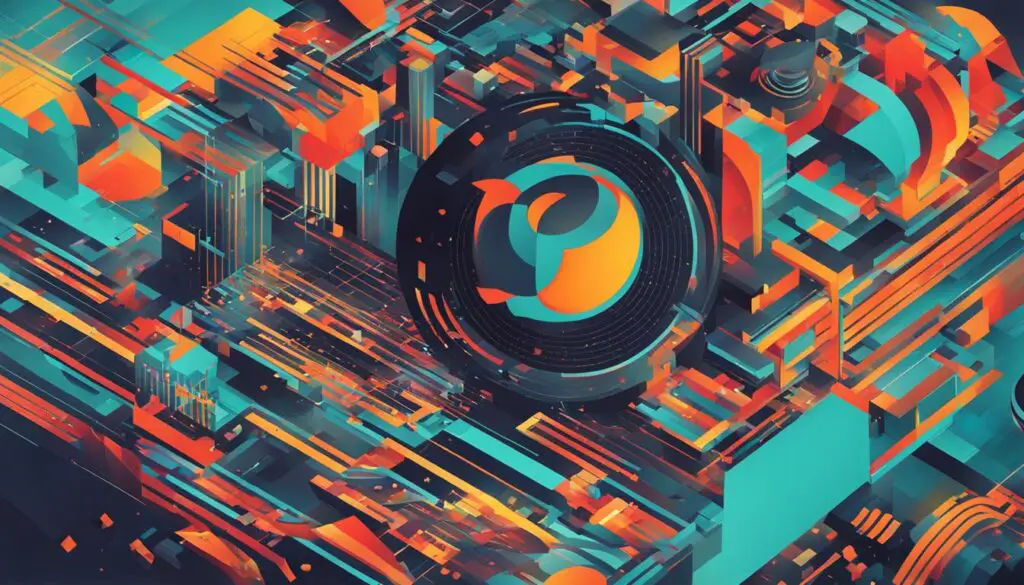
As a digital content creator, it is crucial to have a comprehensive understanding of copyright laws and how they apply to your work. In the digital age, where content can be easily shared and reproduced, protecting your intellectual property becomes even more vital. In this article, I will explain the key concepts of copyright laws and provide valuable insights for content creators like you.
Copyright laws exist to grant exclusive rights to creators of original works, such as literary, artistic, and musical creations, computer programs, and digital content. These rights include the right to reproduce, distribute, publicly display, and create derivative works based on your original content.
While copyright protection is automatic upon the creation of your work, it is crucial to consider registering your copyrights with the U.S. Copyright Office. Registering provides additional legal protections and benefits in case of infringement.
Key Takeaways:
- Understanding copyright laws is essential for digital content creators.
- Copyright protection is automatic, but registering with the U.S. Copyright Office provides additional benefits.
- Copyright infringement can lead to legal consequences for infringers.
- Content creators can enforce their copyrights through cease and desist letters, lawsuits, or DMCA takedown notices.
- Taking proactive measures such as utilizing watermarks and licensing agreements can help protect your content.
The Basics of Copyright Law for Digital Content Creators
As digital content creators, understanding the basics of copyright law is essential for protecting our original works. Copyright law grants us exclusive rights to our literary, artistic, musical, and dramatic creations, as well as computer programs and digital content. These rights include the ability to reproduce, distribute, publicly display, and create derivative works based on our creations.
One of the key aspects of copyright protection is that it is automatic upon the creation of the work. This means that as soon as we create our digital content, it is protected by copyright. This protection lasts for the life of the creator plus an additional 70 years, ensuring that our intellectual property is safeguarded.
While copyright protection is automatic, registering our copyright with the U.S. Copyright Office offers additional benefits and legal protections. This registration provides evidence of our ownership and makes it easier to enforce our rights if they are infringed upon. It also allows us to seek statutory damages and attorney fees in the case of copyright infringement.
In addition to the exclusive rights granted by copyright law, there are also fair use exceptions. Fair use allows for limited use of copyrighted material without permission from the creator. This exception applies to purposes such as criticism, comment, news reporting, teaching, scholarship, or research. However, it is important to understand the boundaries of fair use and ensure that our content falls within the permitted scope.
| Exclusive Rights | Fair Use Exceptions |
|---|---|
|
|
By understanding the basics of copyright law, we can ensure that our digital creations are protected and that we can enforce our rights if necessary. It is important to stay informed about copyright laws, as they can change over time. Proactively monitoring and protecting our content allows us to establish ourselves as respected professionals in the digital age.
Strategies for Enhancing Copyright Awareness and Education
In addition to understanding copyright laws, digital content creators should prioritize educating themselves and their audience about copyright issues. Here are some effective strategies for enhancing copyright awareness:
- Host Educational Workshops: Consider organizing workshops or webinars that focus on copyright basics, infringement risks, and protection strategies. These sessions can be valuable for both new and experienced creators, fostering a deeper understanding of copyright laws.
- Create Informative Content: Develop blog posts, videos, or infographics that break down complex copyright concepts into digestible information. Sharing this content on social media can help raise awareness not only among fellow creators but also within the broader community.
- Engage in Community Discussions: Participate in forums or online communities where content creators share experiences and advice regarding copyright issues. By engaging in these discussions, you can learn from others’ challenges and successes while contributing your insights.
- Collaborate with Legal Experts: Partnering with copyright attorneys or legal experts to provide guidance can enhance your understanding of copyright laws. They can offer valuable advice on best practices and the implications of recent legal changes that may affect your work.
- Utilize Social Media for Awareness Campaigns: Leverage social media platforms to promote copyright awareness campaigns. Use hashtags, share stories of copyright infringement, and provide tips on protecting content to engage your audience and spark discussions.
- Develop Clear Licensing Agreements: When collaborating with other creators, establish clear licensing agreements that define how your content can be used. This proactive approach not only protects your rights but also fosters a collaborative spirit based on mutual respect for intellectual property.
Copyright Infringement and Enforcement for Digital Content Creators
Copyright infringement is a serious concern for digital content creators. It occurs when someone uses, reproduces, or distributes copyrighted material without the permission of the creator. As a digital content creator, it is crucial to understand the enforcement measures available to protect your intellectual property.
Infringers can face legal consequences, including injunctions, damages, and attorney fees. To enforce your copyrights, you have several options:
- Sending cease and desist letters
- Filing lawsuits
- Issuing takedown notices under the Digital Millennium Copyright Act (DMCA)
Utilizing watermarks, copyright notices, and licensing agreements can also help protect your work and deter potential infringers. These measures not only serve as a visual reminder of your ownership but also establish legal grounds for enforcement.
However, detecting and addressing copyright infringement can be challenging, especially in the digital realm where content can be easily shared and reproduced. As a digital content creator, it is essential to proactively monitor and protect your content. Regularly perform online searches for your work, use monitoring tools, and engage with your audience to identify unauthorized use of your creations.
By taking these proactive steps, you can defend your rights and discourage copyright infringement. Remember, enforcing your copyrights not only protects your work but also upholds the value and integrity of your creations as a digital content creator.
Conclusion
Copyright laws are paramount in safeguarding the rights of digital content creators. By familiarizing themselves with the basics of copyright law, content creators can confidently navigate the digital landscape and protect their valuable intellectual property. Staying abreast of any changes in copyright laws and actively monitoring and enforcing their rights are essential practices to ensure ongoing protection of their work.
Creating a proactive strategy to safeguard content is crucial for digital content creators. Implementing measures such as watermarks, copyright notices, and licensing agreements can significantly deter unauthorized use and provide an additional layer of protection. By taking these proactive steps, digital content creators can establish themselves as legitimate and respected professionals in the ever-evolving digital age.
As copyright infringement remains a challenge, especially in the digital realm, it is crucial for content creators to remain vigilant. Regularly monitoring their content and promptly addressing any instances of infringement through cease and desist letters, legal action, or utilizing the Digital Millennium Copyright Act (DMCA) provisions can uphold their rights and deter potential infringers.
Ultimately, by proactively understanding and adhering to copyright laws, digital content creators can confidently protect their work, establish themselves in the industry, and contribute to the continued growth and innovation in the digital sphere.
FAQ
What is copyright?
Copyright is a legal protection that grants exclusive rights to creators of original works, including digital content.
What rights does copyright grant to creators?
Copyright grants creators the rights to reproduce, distribute, publicly display, and create derivative works of their original content.
How long does copyright protection last?
Copyright protection lasts for the life of the creator plus 70 years.
Do I need to register my copyright?
Copyright protection is automatic upon the creation of the work, but registering with the U.S. Copyright Office provides additional benefits and legal protections.
What is fair use?
Fair use allows limited use of copyrighted material for purposes such as criticism, comment, news reporting, teaching, scholarship, or research.
What is copyright infringement?
Copyright infringement occurs when someone uses, reproduces, or distributes copyrighted material without permission from the creator.
What are the consequences of copyright infringement?
Copyright infringers can face legal consequences, including injunctions, damages, and attorney fees.
How can I enforce my copyright?
Content creators can enforce their copyrights through cease and desist letters, lawsuits, or takedown notices under the Digital Millennium Copyright Act (DMCA).
What can I do to protect my work?
Content creators can protect their work by using watermarks, copyright notices, and licensing agreements.
How can I detect and address copyright infringement?
Copyright infringement can be challenging to detect and address, especially online. Content creators should proactively monitor and protect their content.
Source Links
- https://fox40.com/news/national-and-world-news/watch-man-punches-alleged-teen-sex-predator-outside-las-vegas-courtroom/
- https://www.euronews.com/2024/01/30/ai-revolution-is-about-to-ring-in-the-next-chapter-of-polands-history
- https://www.railwayage.com/passenger/transit-briefs-nymta-nj-transit-amtrak/








